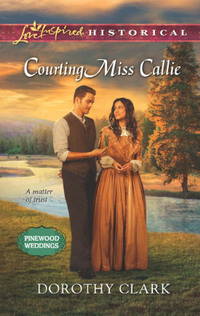
Полная версия
The Law and Miss Mary

“Good afternoon, Miss Randolph. What brings you here to enjoy our hospitality?”
Those brown eyes of hers flashed at Sam. “Good afternoon, Captain. I am in jail because one of your policemen invited me.”
“I see.” Sam’s grin widened. She was not as cool as she pretended. Underneath all that poise Miss Randolph was mad as a wet hen. “Would that be the one who found you at the courthouse refusing to allow the children to go back to work when they were told to do so? And what did you hope to gain by such behavior?”
Mary’s head lifted. “A doctor’s orders that the children were not to work in such heat. Which I accomplished.” A look of pure satisfaction spread across her face.
Sam gave her a mock stern look. “Miss Randolph, what am I to do with you?”
She flashed him a cheeky grin. “Pay my bail?”
MILLS & BOON
Before you start reading, why not sign up?
Thank you for downloading this Mills & Boon book. If you want to hear about exclusive discounts, special offers and competitions, sign up to our email newsletter today!
SIGN ME UP!
Or simply visit
signup.millsandboon.co.uk
Mills & Boon emails are completely free to receive and you can unsubscribe at any time via the link in any email we send you.
DOROTHY CLARK
Critically acclaimed, award-winning author Dorothy Clark lives in rural New York, in a home she designed and helped her husband build (she swings a mean hammer!) with the able assistance of their three children. When she is not writing, she and her husband enjoy traveling throughout the United States doing research and gaining inspiration for future books. Dorothy believes in God, love, family and happy endings, which explains why she feels so at home writing stories for Steeple Hill Books. Dorothy enjoys hearing from her readers and may be contacted at dorothyjclark@hotmail.com.
The Law and Miss Mary
Dorothy Clark

For the Lord seeth not as man seeth; for man looketh on the outward appearance, but the Lord looketh on the heart.
—1 Samuel 16:7
This book is dedicated with appreciation and affection to my extremely talented editor Melissa Endlich, who knows how to make each book the very best it can be. Thank you, Melissa. It is a pleasure to know you, and an honor to work with you.
And a special thank you to my wonderful friend Jean Mallery. It was Jean who first learned, lo these many years ago, that I was secretly writing a book and encouraged me to follow the Lord’s call. If it hadn’t been for you, Jean, I wouldn’t be working on my seventh novel. Thank you for your faithfulness, encouragement and love.
“Commit thy works unto the Lord, and thy thoughts shall be established.”
Your word is truth. Thank You, Jesus.
To You be the glory.
Contents
Chapter One
Chapter Two
Chapter Three
Chapter Four
Chapter Five
Chapter Six
Chapter Seven
Chapter Eight
Chapter Nine
Chapter Ten
Chapter Eleven
Chapter Twelve
Chapter Thirteen
Chapter Fourteen
Chapter Fifteen
Chapter Sixteen
Chapter Seventeen
Chapter Eighteen
Chapter Nineteen
Chapter Twenty
Chapter Twenty-One
Chapter Twenty-Two
Chapter Twenty-Three
Epilogue
Questions for Discussion
Chapter One
St. Louis, 1840
Mary Randolph shifted her gaze from the muddy waters of the Mississippi River flowing under the steamboat to the scratched and gouged promenade deck rocking gently beneath her feet. In spite of the sun shining overhead, both river and deck were dull, lusterless. The same as she. Tears flooded her eyes. She blinked them away and squared her shoulders, refusing the thought, determined that no remnant of the past would cloud this first glimpse of her future.
The tempo of the engines driving the paddle wheels slowed. A raucous blast from the boat’s whistle split the air. Mary gripped the rail with both hands and peered out at the city of St. Louis, thankful for the sudden downdraft of wood smoke from the steamer’s tall stacks that made her eyes smart and water, giving her an excuse for any betraying, glistening tears.
The Fair Weather gave another blast of her whistle, slipped into a berth and nosed up to the bank. Cobblestones paved the incline from the river’s edge that leveled off in a street that formed the city’s front door. Mary crowded closer to her brother in the sudden press of passengers along the rail and studied the area. Steamboats and other river craft of all descriptions lined the sloping bank, taking on or unloading passengers. Smokestacks belched plumes of acrid smoke into the warm, moist air. Whistles blew, announcing arrivals and departures. Ships’ mates shouted orders to their crews. Chains rattled and ropes squeaked with tension as cargo was taken aboard or lowered to the dock. Hammers pounded as repairs were made. And beneath the din hummed the constant murmur of voices.
Mary blinked the moisture from her eyes and took a step back to use her brother as a windbreak while she adjusted her new hat. “I did not expect such a hustle and bustle of activity in a frontier city.” She shook out the long tails of diaphanous fabric streaming from the base of her top hat down her back, and moved forward again to stand at the rail. “There must be at least twenty or twenty-five steamboats docked along this shore, James.”
“I make it closer to thirty, perhaps more. It’s difficult to tell.” James leaned over the rail as far as he was able and looked up and down the shoreline. “There are so many smokestacks it looks like a forest growing out of the river.” He pushed himself erect and placed his mouth close by her ear. “And only six of these steamers are ours—including this one. I shall write Father of the stiff competition immediately.”
Mary released her hold on the rail, stared at the flecks of peeling paint on her gloves and lowered her voice to match his. “Do you suppose Father knew of the neglected, weather-beaten condition of the ships before he bought the line? If the Fair Weather is any indication, the vessels of the Mississippi and Missouri steamer line are in very poor condition.”
“He knew. Wilson had all the information when he came to St. Louis to make the deal in Father’s stead.” James leaned closer to her. “And Father knows why. His agent had reported someone has been letting the ships fall into disrepair while they skimmed off the profits. I am to discover the culprit.”
Mary stopped brushing her hands together to rid her gloves of the paint specks and looked up at him. “So that is the reason for our secrecy.”
“Exactly.” He turned his mouth back to her ear. “If anyone learns our father is the new owner, the thieves will cover their tracks and disappear. We must be cautious and trust no one with that information until I uncover the truth.”
“You are warning me to silence?” Mary shot him a look of disbelief. “Surely you do not think anyone will learn our father purchased the line from me? Why, if I were a devout person, I would be on my knees this very moment giving thanks to God for our secrecy. This is the perfect situation for me.” Her face tightened. “Of course, if it were not for God, I would not need anonymity from Father’s wealth and status.” The words came hissing out in a bitter whisper. She pressed her trembling lips together and turned away from the flash of sympathy in her brother’s eyes.
“Mary, listen—”
She shook her head. Wind gusted over the rail, snatched the long, flowing tails of fabric on her hat and whipped them forward again. She brushed the filmy fabric from her face and swallowed the tears that threatened to expose her heart.
“Mr. Randolph?”
“Botheration!” James sucked in air and held it. She glanced at him through her lowered lashes, saw his frown. The threat of tears fled. A smile tugged at her lips. She, Sarah and James all used the “hold and count” method to gain control when they were upset or annoyed. It was one of the gems of wisdom their mother had taught them. Mother. Homesickness washed over her like the river water whispering along the shore.
“We will discuss this later.” James whispered the words into her ear and turned. “I am James Randolph.”
Mary watched a heavy-set man, garbed in a black suit, shoulder his way through the milling crowd of passengers to stand beside them. She straightened as the man peered at her, his gray eyes magnified by the wire-rimmed glasses perched on his slightly bulbous nose. He dipped his head in a polite bow and looked back at her brother. Surprise—no doubt at James’s youth—flickered across his face, quickly replaced by an expression of polite respect.
“Eli Goodwin at your service, Mr. Randolph. I am the bookkeeper of the Mississippi and Missouri steamer line. Captain Lewis sent word of your arrival, and I have come to escort you to the manager’s residence. Mr. Thomas, the former manager, vacated the premises when he was dismissed from his position. You need not wait for your trunks. I have arranged for them to be delivered.”
“How good of you, Mr. Goodwin. My sister and I have had a long journey and are most eager to get settled into our new home.”
The man nodded. “I trust your accommodations aboard ship were comfortable and your journey a pleasant one. If you will follow me?” He turned toward the stairs leading down to the main deck.
James stepped back from the railing, creating a small space in the press of people. Mary gathered close the long, full skirt of her dark blue gown and stepped into the void he had created. Urged forward by her brother’s hand at the small of her back, she followed in Eli Goodwin’s wake.
Samuel Benton stood at the edge of the river, narrowed his eyes and drifted his gaze over the Fair Weather’s main deck. A few frowns, a few curt nods revealed that his purpose in coming to the levee had been accomplished—the crew knew the law was present and watching them. Perhaps it would be enough to discourage anyone who might intend to damage the ship. Though it could be that such danger no longer existed since the line had changed owners.
Sam scanned the deck again, paying particular attention to the firemen and engineer. He did not believe the mishaps on the three previously destroyed or heavily damaged boats of the Mississippi and Missouri steamer line were all accidental. Boiler explosions and shipboard fires were common occurrences on the river, but not to three of one line in such close succession. He had a hunch someone had helped the “accidents” along. And, after his talk with Thomas last week, it had seemed possible that the new owner of the line had a hand in it. It would not be the first time sabotage had been used to drive down the purchase price of a business. And the secrecy of the buyer’s name was a possible indication of his involvement in the crimes. As Thomas said, what other reason could the new owner have for keeping his identity hidden? Of course, being replaced as manager of the line, that could be Thomas’s anger talking.
Sam frowned and raised his gaze to the steamboat’s promenade. He would have a clearer picture of the situation after he talked with James Randolph, the man taking Thomas’s place as manager of the M and M line. Randolph was somewhere in that milling throng of people and he wanted to meet him, find out what sort of man he was. But first he wanted to ask Captain Lewis who, if any, of the crew Randolph may have met with during the trip. And it would be interesting to know who Randolph would speak with on his first afternoon in town.
Passengers began to file down the Fair Weather’s gangplank in a steady stream. Sam glanced their way, automatically checking faces for known criminals or gamblers with bad reputations. A flutter of blue on the promenade deck caught his attention. He looked up, saw a woman brush at the material adorning her hat. His policeman’s mind registered facts—the woman was taller than average, and thinner, with dark hair. Not particularly pretty—at least not in a conventional way. But there was something arresting about the woman, about the way she held herself.
He watched her wend her way toward the stairs leading down to the main deck, noting her graceful, but purposeful way of moving. There was nothing simpering or clingy about her. And he guessed she did not need the protection of the man guiding her through the crowd. She looked quite able to manage without an escort. The way she followed in the wake of that man in front of her, bespoke—
Goodwin! Why was he here? To meet the new manager?
Sam scowled. He had been wondering if Goodwin had a hand in the M and M steamer disasters, though Thomas said no. He tracked the progress of the three of them with new purpose. Yes, the woman was definitely staying close to Goodwin. So the fellow with her must be the new manager. Thomas had not mentioned James Randolph was married. Sam shifted his focus to the man, catalogued the facts. Tall, dark, well-groomed. Fit, but on the slender side. He could not see his face. The three disappeared in the crush of people at the top of the stairs.
Sam pivoted and loped toward the gangplank. He would talk to Captain Lewis later. “Pardon me, sir.” He gave a polite nod to the fellow coming off the walkway, stepped in front of him and held out his hand to stop the couple beside him. “Pardon me, please.” He hurried past them, leaned against a wagon loaded with firewood and riveted his attention on the flow of people. It would be interesting to see if anyone other than Goodwin disembarked with the Randolphs. Or if someone was waiting to meet them.
Sam gave the area another quick scan, frowned. It was odd Thomas wouldn’t meet his replacement. A twinge of unease reared. He quashed it. Thomas could be waiting at the office. Or he could be angry enough that he refused to meet Randolph and help him settle into his new position.
Three men and two more couples filed past. Sam glanced up. Eli Goodwin was at the top of the gangplank, the Randolphs at his heels. He studied James Randolph’s face, looking for clues to the man’s character, trying to decipher if he was expecting to meet someone. Randolph was young, very young, for such a responsible position. He looked to be no more than nineteen or twenty. Half Thomas’s age. Sam shifted his gaze for a quick look at Randolph’s wife and peered straight into her eyes. Brown eyes. Not dark. Medium—like her hair. And challenging.
Sam stiffened, told himself to look away—knew it was already too late. She had spotted him studying her husband. He watched them descend, let Eli Goodwin pass and stepped around the wagon into the path of the young couple.
“Mr. Randolph?”
“Yes?” The man stopped, looked up at him, dark blue eyes posing a question.
“I am Samuel Benton, Captain of the St. Louis police.” He glanced at Randolph’s wife, saw the coolness in her eyes, gave her a polite nod and looked back. “I bid you and your wife welcome to our fair city.” He offered his hand, received a firm clasp in return. “I will be calling on you tomorrow. There are a few rules, regulations and other matters about running a steamboat line in St. Louis that I want to discuss with you.”
James Randolph nodded. “I shall await your visit with interest, Captain.” He turned to the woman and grinned. “Come, dearest, Mr. Goodwin is waiting to show us to our new home.” He took hold of her elbow.
The woman laughed, changing her countenance from cool and austere to fond and amused. Her lips, which had been pressed into a firm line, curved upward in a soft smile. Honey-colored flecks sparkled warmth into her large, brown eyes fringed with long lashes. Sam stared, taken aback. How had he thought her not particularly pretty? She was—
“Stop it, James. Captain Benton cannot know you are teasing.”
Her voice was low-pitched for a woman’s, soft and easy on his ears. A bit husky. Intriguing. She glanced up at him from beneath her hat’s stiff brim and discovered him looking at her. The warmth in her eyes cooled.
“You have erred in your conclusion, Captain Benton. I am not James’s wife. I am his sister.”
“Forgive me, Miss Randolph, I assumed—”
“There is no apology or explanation needed, Captain. It was a natural assumption and of no import. I merely wanted to correct your error.” The river breeze blew the fabric adorning her hat into her face. She frowned and pushed it back, looked up at him again, all trace of warmth and humor gone. “Now, if you will excuse us—I am weary from the journey and anxious to reach our new home. And to remove this ridiculous hat.”
Her frosty demeanor killed his smile. “Of course, forgive my poor manners in detaining you.” He glanced over at her brother. “Until tomorrow, Mr. Randolph.” He gave them a polite nod and headed for the gangplank. If he hurried he could still catch Captain Lewis. James Randolph seemed open and friendly enough, but that did not mean he was above a little unscrupulous behavior. Perhaps on behalf of his boss? He would keep watch on his movements the next few days. As for his sister…what did that “ridiculous hat” comment mean? Women did not wear hats they considered ridiculous. Had she worn it by way of identification to Goodwin? Or as some sort of signal to someone else?
Sam frowned, stepped onto the Fair Weather’s main deck and turned to look out at the levee. Eli Goodwin was leading James Randolph and his sister up the incline to Front Street. No one had joined them. He scanned the area but could spot no one paying the Randolphs any particular attention.
He watched a moment longer, then satisfied he had missed nothing of importance, turned and strode toward the stairs leading to the captain’s quarters on the hurricane deck. He would not only ask about James Randolph’s activities on the journey, he would ask about Miss Randolph’s activities, as well. It was quite possible—in spite of that forthright look in those beautiful, brown eyes of hers—that she would help her brother if he was involved in this steamboat sabotage business. He took another quick glance over his shoulder at the tall, slender figure in the dark blue gown, then gripped the railing and, bucking the flow of the departing passengers, started up the stairs.
Chapter Two
Mary walked beside James, taking in the hubbub of sound and motion around them. Workmen streamed in and out of warehouses, carrying filled burlap bags on burly shoulders or swarmed over huge stacks of crates or barrels. Laborers loaded carts with firewood and hauled it to their boats. Animals, in gated farm wagons, lowed and snorted. Others grunted and squealed as they were forced up gangplanks. Chickens squawked while barking dogs circled their cages. Mary had never seen or heard anything to compare with it. It was organized bedlam.
“That is our warehouse, Mr. Randolph.” Eli Goodwin paused and pointed. “The one you see overtop the roofs of these smaller storage sheds. It was built on the higher ground because of flooding.”
Mary’s stomach flopped. She glanced from the large, brick building with “Mississippi and Missouri Steamer Line” sprawled in large, faded-white letters above the fourth-story windows to the muddy river, and was suddenly very thankful for the rising levee bank they were climbing.
“Does the river flood often?”
James’s question brought a flash of the flat, rolling land along the river’s banks into her head. Mary glanced at Mr. Goodwin.
The man nodded. “You can count on it in the spring. And if there are heavy rains upriver throughout the year, she will flood again. And there is no telling how high the river will rise. But business goes on. When floodwater covers the levee, the captains run their steamers in and moor them to the warehouses.”
“You jest!”
James’s challenge of the story gave her hope. It died when Eli Goodwin shook his head and started walking again. Mary tossed her brother a look of dismay, then followed the bookkeeper as he wove his way through the various piles of merchandise to the street at the top of the levee. Carriages, carts, drays and wagons of all sort rumbled over the cobblestones. Mounted men added to the traffic flow.
“This is Front Street. And that is Market Street across the way.” Eli Goodwin indicated an intersecting road a short distance from them. “And there, on the near corner, is the company office.”
Mary looked over at the narrow, two-story stone building. An oval sign bearing the company name held its place between a door and two mullioned windows painted red.
“A bank on one side, and an insurance company on the other corner. An excellent location.”
Mary smiled at the satisfaction in James’s voice. “And it is only a few steps away from the warehouse on the levee. Surely that is of benefit.”
The bookkeeper nodded and shoved his glasses higher on his nose. “Do you wish to visit the office now?”
James shook his head. “No, tomorrow will be soon enough. For now, I want to get Mary settled in our new home. Is it far?”
“No, sir. It is only two streets away. We will cross here.”
James’s hand closed on her elbow. Mary pulled close her long skirts to avoid horse droppings as they followed Eli Goodwin across Front Street, dodging between a farm wagon full of produce and another loaded with squealing pigs to reach the walkway area in front of the stores. “Gracious me!” She jumped out of the path of a honking, wing-flapping goose being chased by a dog. “I have never witnessed such…such…”
“Pandemonium?”
She looked up at James and laughed. “The very word I was searching for.”
“It is much quieter away from the levee, Miss Randolph. We go this way.” Eli started walking up Market Street. The din of activity fell away as he led them past an intersecting dirt road, then turned right onto the next one and stopped. “This is it.”
Mary stared at the small brick house sitting square on the corner lot. A porch across the face of the cottage shadowed the two mullioned windows, one on either side of a centered door painted white. Wood shingles, bleached and curled by the hot Missouri sun, covered the porch and house roof. Two brick chimney stacks stood at the cottage’s gabled ends.
The chain supporting a dangling cannonball squeaked in protest as Eli Goodwin pulled open the gate in the lime-coated picket fence that enclosed the property. Mary dipped her head, thankful her hat was wide enough to hide her face, and stepped through the gate and up the short, brick walk. James would surely laugh if he saw her shock. Although, from his silence, she was quite certain he was as stunned as she. The cottage was charming, but so small. Why, you could set the whole of it into one end of the stables at home.
“Mrs. Dengler cleaned the place, made up the beds fresh for you and such. And I arranged for Mrs. Rawlins to leave a meal for you. She was cook for Mr. Thomas, the former manager, and has agreed to cook for you if you wish. They will both call on you tomorrow morning to learn if you want them to stay on, or if you prefer to set about finding other help.” A frown drew Eli Goodwin’s brows together. “I believe that is all. Here is the key to the house, Mr. Randolph.” He handed James a skeleton key, gave a curt nod. “I wish you a good evening, sir. And you, Miss Randolph.”
“And you, Mr. Goodwin.” Mary offered the man a polite smile. “Your thoughtfulness will make our first evening in our new home a comfortable one. Thank you.”
“And you have my gratitude as well, Goodwin. I will see you at the office tomorrow.” Once inside, James closed the door, hung his hat on the hat tree and followed Mary as she moved out of the narrow entry into the room on the right. “I wonder if Mr. Goodwin ever smiles?” He shrugged and glanced around the small parlor. “Well, here we are in St. Louis.” His lips twisted in a wry grimace. “In a very small cottage. Are you sorry you came?”









